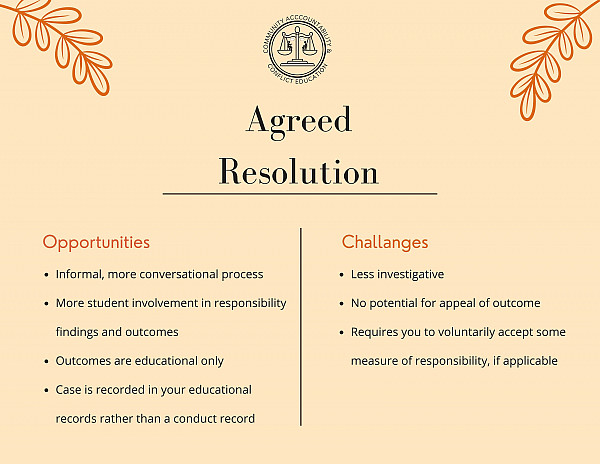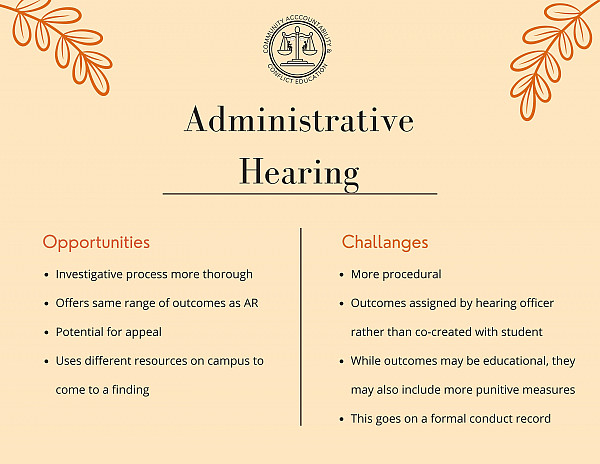Frequently Asked Questions
Like any community, we have a set of collaboratively established standards that all members are expected to uphold in order to maintain the safety and educational purpose of our community. Our guiding principles of mutual respect, civil discourse, academic inquiry, responsible decision-making, and personal accountability inform these standards that are detailed in the Student Code of Conduct.
When students complete their registration agreement to attend Lewis & Clark, they acknowledge their responsibility to “be familiar with the academic and administrative regulations, procedures, and policies”, which includes the Student Code of Conduct and college policies. Students are notified of the Code and policies annually through their Lewis & Clark email.
Additionally, Lewis & Clark is required by Federal law to comply with certain standards as an educational institution that receives federal financial aid.
The Office of Community Accountability & Conflict Education defines ‘Involved Students’ as any student who is mentioned in an information report. There is a difference, however, in how students are involved.
Involved Students
In an informal resolution pathway, students who were present for a situation of concern may be contacted to speak with someone about the situation, to discuss the nature of their involvement, and to seek resolution.
Respondents
Students against whom a formal complaint has been filed, or who are participating in a formal adjudication process are defined as ‘respondents’ because when they meet with a Conduct Authority they are responding to allegations of harm or potential misconduct. If you are a Respondent in a formal adjudication, we encourage you to review the Code of Conduct and the materials available on our website to ensure you understand the process.
Witnesses
Witnesses may have information about events described in an information report, and may become involved for this reason. The College, the Respondent, and Complainant when one is present, are allowed to request that a witness participate in a formal board hearing. If you are called for a hearing, your participation in the hearing is optional.
Complainants
If a student feels like another student has caused harm or violated the Code of Conduct, in a way that directly affects either them or the community, they can bring a formal complaint. If you want to make a complaint, please contact the Office of Community Accountability & Conflict Education or talk to your Area Director.
The Assistant Dean of Students determines how each conduct case will be resolved. While there are several conflict resolution pathways available, most students documented for alleged misconduct have either an informal meeting known as an “Agreed Resolution” or a formal hearing (as outlined in the Code).
Both informal meetings and formal hearings rely on dialogue between the student and an administrator(s). In an Agreed Resolution, the Resolution Coordinator and the student attempt to reach a mutual agreement regarding which policies were violated and how the issue will be resolved. This meeting focuses on the policy potentially being violated, the harm it may have caused to the student and their community, and how they can repair that harm or reflect on their actions. If an agreement about resolution can occur, the record is maintained as an education record rather than a conduct record. Students are not required to participate in an Agreed Resolution, as it does require you to voluntarily accept your responsibility for the situation. If you would prefer a formal investigation and hearing, or if you are unable to come to an agreement with your Resolution Coordinator, let CACE know.
Students with severe allegations of misconduct, repeated potential violations, or who don’t want to complete an Agreed Resolution process will typically be referred to a formal hearing process. In most cases, this will be an “Administrative Hearing”, though some rare cases may be referred to the College Review Board. In an Administrative Hearing, the hearing officer determines which policies were violated and how the issue will be resolved, though we still try to be educational and collaborative in these meetings. Administrative Hearing records become a part of a students disciplinary record and are retained for 7 years.


Start by thoroughly reading the official correspondence that you received confirming your meeting time, and be sure to review the policies in your letter. If you have any questions or if you would like to review the report and other evidence in your case, feel free to get in touch with our office by emailing cace@lclark.edu. You may also read more about formal hearings in the Code of Conduct.
While cases resolved informally cannot be appealed, after any formal adjudication process, an involved student may appeal for a variety of reasons. The timeline to appeal is within 5 business days of you receiving your outcome letter. A full outline of the possible grounds for appeal can be found in the Code of Conduct.
When a student is found to be responsible for violating College Policies, they are typically assigned one or a series of outcomes that they need to complete in order to resolve the case. Outcomes serve as a way for students to remedy any harm they may have caused, reflect upon the impact of their actions on the community and themselves, and provide educational pathways for student growth in a variety of areas (conflict resolution, organization and planning, academic success, stress management, etc).
Outcomes assigned vary greatly, and are typically tailored to each individual student’s situation and needs. They range from apologies to reflection papers, from community service to disciplinary probation, and can include suspension or dismissal. Resolution Coordinators and hearing officers will explore possible outcomes with involved students during their respective informal meetings or hearings.
When a student goes through a formal resolution process, or Administrative Hearing, a responsible finding will be recorded a conduct or disciplinary record. These records are kept for 7 years after you graduate or leave Lewis & Clark College, unless the outcome is a suspension or expulsion, in which case they are kept indefinitely. Outside parties, such as law schools, grad schools or jobs, only can see these records if a student gives them permission through the Registrar’s Office.
All other records, including those of our informal processes or Agreed Resolutions, are considered educational records. These records are only seen by you or relevant staff at Lewis & Clark, and they are usually not shared with outside parties. See the College’s Record Retention Policy.
As a student, you and your educational records are protected by the Family Educational Rights & Privacy Act (FERPA). FERPA ensures students have the right to inspect, review, and control access to your records. Therefore, we cannot share any information about your case or discussions with CACE with your parents or anyone outside of staff with a need-to-know unless you release that information. The only time CACE may need to loop in your emergency contact is if your health or safety may be at risk. Learn more about FERPA and release forms.
Students are permitted to bring a support person or advisor for formal adjudication processes, but should notify CACE prior to doing so. These individuals are not permitted to speak during the hearing process, but they can help you prepare for your meeting. CACE will ask you to complete a FERPA Release of Information with the Registrar prior to your meeting, so that we have permission to share your records with this individual.
If you would like CACE to help you in finding a support person, please read more about our Respondent Support Staff and how to request the assistance of one of our Division staff members.
Community Accountability and Conflict Education is located in Odell Annex on the Undergraduate Campus.
MSC: 113
email cace@lclark.edu
voice 503-768-8181
Assistant Dean of Campus Life and Student Rights and Responsibilities
Jessica Caron, MEd
Community Accountability and Conflict Education
Lewis & Clark
615 S. Palatine Hill Road
Portland OR 97219
